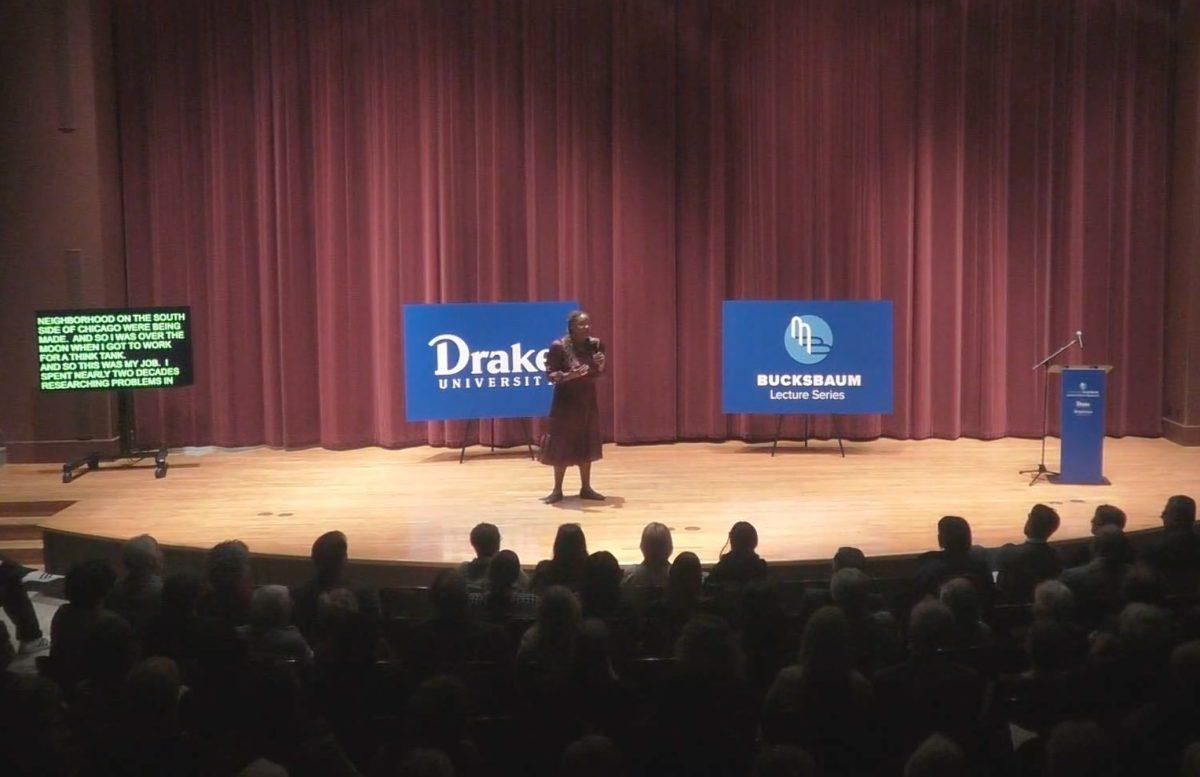“Why can’t we have nice things?” Heather McGhee directed this question, poised in the first sentence of her new book, to the full crowd gathered at Sheslow Auditorium on Drake University’s campus on Nov. 1. The crowd diligently waited for the answer.
McGhee, a researcher, problem solver and author of New York Times bestselling novel “The Sum of Us” was the first speaker of Drake’s inaugural Bucksbaum Lectureship Series in Business.
“The economy is not the weather. It’s not just a set of uncontrollable, unforeseen forces that we have to protect ourselves against,” McGhee said in her lecture. “The economy is more like a game. It’s more like a game where there are rules. Those rules are decided by the most powerful players, and they decide how you are able to advance and score points.”
An expert on economic disparities, McGhee tied racial and social justice to the center of economic solutions.
According to McGhee, the answer to America’s lack of universal health care and well-funded public schools, which other wealthy and developed countries have secured, lies in the zero-sum game concept. McGhee called this zero-sum game a racialized story that America has fought to continue.
“We know that, in a zero-sum game, there can be no mutual progress,” McGhee said. “If one player scores a point, the other player loses a point. [It’s] a story that says that there’s kind of a fixed pie of well-being. If I get a bigger slice, that means that you must get a smaller slice.”
McGhee described the zero-sum game as economic progress which only ever grows as the result of people of color, specifically African Americans, seeing a decline on their own economic progress and therefore on their own quality of life.
“Generally speaking, Americans of color don’t think that our progress has to come at White folks’ expense, but the reverse is not true,” McGhee said.
McGhee described mutual progress, especially progress for people of color, as being actively discouraged and fought against in all corners of the United States. McGhee cited the carcass of the Oak Park pool in Montgomery, Alabama, she came across while driving with her family as a prime example for the distaste of mutual progress in the U.S.
In response to the legal end of Jim Crow laws in the 1960s in Montgomery, Alabama, instead of complying with desegregation orders, the city voted to close down the pool. In addition, the entire Montgomery County parks and recreation system was terminated. All of this was done to avoid integration
Coincidentally, White families began installing in-ground pools in their own backyards around this time.
“I began to see in this very real story a metaphor — something that helped really explain how this country that invented the formula for widely shared prosperity was willing to turn their backs on this formula. I called it ‘drained pool politics,’” McGhee said.
McGhee’s “drained pool politics” refers to the draining of a public resource, when those who are financially capable can still float on by.
When Richard Nixon’s and Ronald Reagan’s presidential administrations shifted away from public funding, college became more expensive, and college degrees became the standard education level necessary to obtain jobs. These decisions, in turn, made high-paying jobs available to those who could afford a college education. Those were mostly White people.
“When I see ‘drained pool politics’ across so many of our systems, I see, just like when a town drains their public swimming pool rather than integrate it, we all pay a cost,” McGhee said. “Racism in our politics and our policy making has a cost for everyone. It’s not by any means an equal cost.”
Chloe Lepak, sophomore and the community engagement student senator, attended the lecture and found McGhee’s theory very informative.
“The connection she has found between the economy and effects of racism are important to, firstly, recognize, and, secondly, do something about,” Lepak said.
After her visit to Drake, McGhee told The Times-Delphic that she hopes that students will unlock mutual progress.
“I hope that students will get a history of the country that helps answer some questions about the present, and for Drake’s diverse student body, a way for students of all backgrounds to see some mutual interest in addressing racism,” McGhee said.









Em Tee • Jan 16, 2025 at 1:12 pm
Still learning American History. Thank you.